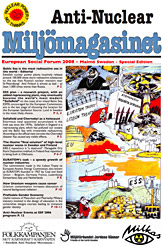RUSSIA
“Antiatom.ru” is non-commercial information agency established in 1994 by Ecodefense, Russian environmental group. It existed for 8 years exclusively in form of electronic newsletter “Anti-Atom Press” and in 2002 appeared as Russian language web-site. “Antiatom.ru” is mostly covering issues related to nuclear power and anti-nuclear activities.
In 1999, the Russian government announced its intention to import and store twenty thousand tons of nuclear waste primarily from East Asia and Central and Western Europe.
ECOLOGIA’s programs bring international perspectives and resources to local sustainable development projects, and bring locally based ‘on the ground’ experience back to the world of international decision making. There are regional offices in China, Russia and United States.
Founded in the end of 2008, environmental group “ECOperestroika” cooperates with a number of environmental and human rights organizations (Ecodefense, Green World, Save Yuntolovo, Greenpeace, Memorial und anarchists). For our campaigns we engage experts in nuclear physics, ecological scientists and lawyers. Information in Russian, English and German.
—————————————————————————————————————————————
 BALTIC NEWSLETTER OF THE GREEN WORLD December 23, 2009, № 106
BALTIC NEWSLETTER OF THE GREEN WORLD December 23, 2009, № 106
Information periodical of the environmental NGO GREEN WORLD,South Coast of the Gulf of Finland.
http://www.greenworld.org.ru/?q=ang_bv106
www.greenworld.org.ru www.decomatom.org.ru
P.O. Box 93/7, Sosnovy Bor 188544, Leningrad Oblast, Russia
Tel./fax: +7(81369) 72991; е-mail: bodrov@sbor.net
Russia decided without an environmental impact Assessment to continue operation of the old nuclear reactor of the Leningrad npp.
“On 9 December 2009 Rosenergoatom (Russian NPPs operator) gave notice of the granting by Rostekhnadzor (Russian NPPs regulator) of the license for the third energy bloc, thereby extending the life of the Leningrad NPP until 31 January 2025. This is 15 years longer than the designers of these reactors planned.
The decision was taken behind closed doors, without public hearings, without an analysis of the possible alternative solutions of the energy problem. An environmental impact assessment, required by law, was not conducted.
The taking of this decision did not take into account:
1. The absence of technological solutions for the spent nuclear fuel of the RBMK-1000 reactors. After 36 years of work of the Leningrad NPP, no economically and environmentally acceptable technology for the processing or long-term storage (for hundreds and thousands of years) of the spent nuclear fuel has emerged.
2. The energy redundancy of the region. Energy is transferred to other regions of Russia and to Finland in an amount equivalent to that generated by the two energy blocs of the Leningrad NPP. The export of nuclear-generated electricity is equivalent to the import of spent nuclear fuel, a problem which is not yet solved.
3. The potential of energy conservation in Northwest Russia (40%) is equal to the production of the 4 energy blocs of the Leningrad NPP. Thus the environmentally dangerous old energy bloc could, without damage for the economy and for the good of the environment, be halted and its decommissioning begun;
4. Modernization of old thermal power plants, functioning in the region and their transformation into a CCGT (combine cycle gas turbine) could raise, without an increase in gas usage, their energy production by 1.7 times.
5. A mechanism of environmental monitoring, independent of Rosatom and transparent to the public, is absent within the area of the site of the Leningrad NPP, while at the same time:
- Genetic disturbances have been observed in the local pine trees. In Sosnovy Bor and in the vicinity of the Leningrad LPP, disturbances in the seeds of the trees are 2-3 times greater than at a distance of 30 km in the direction of St. Petersburg;
- Tens of millions of fish per year die in the water collectors of the operating Leningrad NPP, which functions without protection equipment for the fish; in the past 36 years, billions of fish of the Baltic Sea have died at the water collectors of the Leningrad NPP;
- Catches of fishermen on the Southern Shore of the Gulf of Finland (village of Vistino) has decreased by 4 times in the last several years; the existence of a fishing industry has practically ceased to exist (the canning plants in Sosnovy Bor and Vistino are now closed);
- In Sosnovy Bor the number of cancerous sicknesses has increased by two times in the last 15 years;
- Water pollution of the Baltic Sea exists due to a powerfully warm outlet from the Leningrad NPP, and as a consequence, accelerated anthropogenic eutrophication of the marine ecosystems.
6. Beginning in 2013, the risk of an accident at the Leningrad NPP in Sosnovy Bor will grow, in conjunction with the launching of the first (2013), and then second (2015), energy blocs of new Leningrad NPP-2. From that time the dangers will be the greatest, and it will be the most dangerous period from the point of view of the reactors that will just be beginning to operate, and those which will be reaching the end of their life cycle. At that moment in Sosnovy Bor, which is 80 km from the center of St. Petersburg, six energy blocs of the Leningrad NPP will be operating with an overall power of 6300 MW, not including the four military reactors for the nuclear submarines being tested in the Scientific Institute named for A.P. Aleksandrov. This is the largest concentration of nuclear sites on the Baltic Sea.
7. An accumulation of financial resources and preparatory events, like those in Lithuania, in order to prepare for the decommissioning of the oldest energy blocs of the Leningrad NPP.
Thus, the non-transparent, and environmentally unjustifiable political decision for extending the life cycle of the third energy bloc of Leningrad NPP, is diametrically opposed to the solution of decommissioning of the reactor of an analogous type, the Ignalina NPP, and does not meet the long-term interests of Russia.
On 31 December 2009, with the halting of the Ignalina NPP, only Russia will continue to operate RBMK-1000 energy blocs, which are considered to be unacceptably dangerous in the rest of the world. Eleven similar energy blocs on the Leningrad, Kursk, and Smolensk NPP will continue their work.
Russia needs a new energy policy, based on energy efficiency, renewable energy sources, and the priority of environmental safety. It is essential to decommission the Leningrad NPP.
The decision about the lifetime extension of Leningrad NPP will increase the risks for environment and people not only for the Russia, but also for the residents of the Baltic Region.”
************************************************************************************************************
the issue was prepared by
Oleg Bodrov, Nathaniel Trumbull

